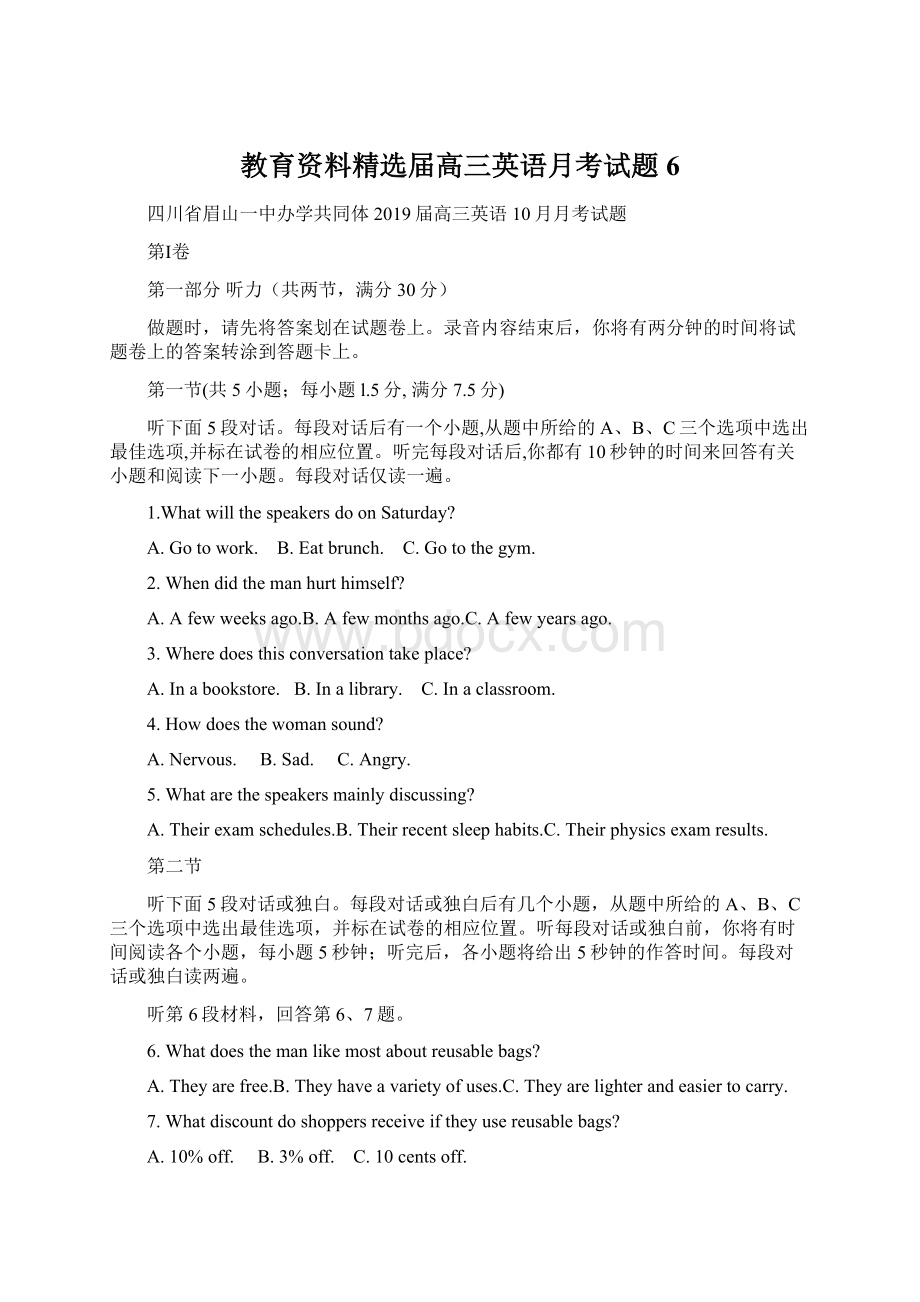教育资料精选届高三英语月考试题6Word下载.docx
《教育资料精选届高三英语月考试题6Word下载.docx》由会员分享,可在线阅读,更多相关《教育资料精选届高三英语月考试题6Word下载.docx(14页珍藏版)》请在冰豆网上搜索。

1.WhatwillthespeakersdoonSaturday?
A.Gotowork.B.Eatbrunch.C.Gotothegym.
2.Whendidthemanhurthimself?
A.Afewweeksago.B.Afewmonthsago.C.Afewyearsago.
3.Wheredoesthisconversationtakeplace?
A.Inabookstore.B.Inalibrary.C.Inaclassroom.
4.Howdoesthewomansound?
A.Nervous.B.Sad.C.Angry.
5.Whatarethespeakersmainlydiscussing?
A.Theirexamschedules.B.Theirrecentsleephabits.C.Theirphysicsexamresults.
第二节
听下面5段对话或独白。
每段对话或独白后有几个小题,从题中所给的A、B、C三个选项中选出最佳选项,并标在试卷的相应位置。
听每段对话或独白前,你将有时间阅读各个小题,每小题5秒钟;
听完后,各小题将给出5秒钟的作答时间。
每段对话或独白读两遍。
听第6段材料,回答第6、7题。
6.Whatdoesthemanlikemostaboutreusablebags?
A.Theyarefree.B.Theyhaveavarietyofuses.C.Theyarelighterandeasiertocarry.
7.Whatdiscountdoshoppersreceiveiftheyusereusablebags?
A.10%off.B.3%off.C.10centsoff.
听第7段材料,回答第8至10题。
8.Whydoesn’tBradlikeonlineshopping?
A.Hedoesn’tliketoplan.B.Hedoesn’tliketostayathomewaiting.
C.Hedoesn’twanthispackagesstolen.
9.WhatdoesBradadviseSallytodo?
A.Gotothestore.B.Cleanthehouse.C.Keeptrackofherpackage.
10.HowisSallyrelatedtoBrad?
A.She’shismom.B.She’shisemployee.C.She’shissister.
听第8段材料,回答第11至13题。
11.Inthebeginning,whatdoesthewomanthinkGeorgeisdoing?
A.Reading.B.Coloring.C.Writing.
12.Whyaresomeofthetextsmarkedingreen?
A.Theyarethemainideas.B.Theyareimportantdetails.C.Theyareabitmoredifficult.
13.AccordingtoGeorge,whyisactivereadinguseful?
A.Ithelpsstudentslearnnewwords.B.Itshowsstudentswhattheyalreadyknow.
C.It’sagoodlearningmethodforbothslowandfaststudents.
听第9段材料,回答第14至17题。
14.Whowillknowaboutthemovetonight?
A.Lily.B.Katie.C.Jason.
15.Accordingtothewoman,whatismuchbetterinFrance?
A.Thefood.B.Theweather.C.Theschools.
16.Whatdoesthemanhopetodoabouthisfamily?
A.BringthemtoFrance.B.LeavetheminAmerica.C.Visittheminafewmonths.
17.Whatistherelationshipbetweenthespeakers?
A.Bossandsecretary.B.Familymembers.C.Co-workers.
听第10段材料,回答第18至20题。
18.Whatisthemostimportantrequirementforthisjob?
A.Experience.B.Creativity.C.Energy.
19.Whatdochildrendointhemorning?
A.Gohiking.B.Writeshortessays.C.Reporttotheleaders.
20.Whenistheapplicationdue?
A.InlateApril.B.Inmid-May.C.InearlyJuly.
第二部分阅读理解(共两节,满分40分)
第一节(共15小题;
每小题2分,满分30分)
阅读下列短文,从每题所给的四个选项(A、B、C和D)中,选出最佳选项,并在题卡上将该项涂黑。
A
Planyourdreamvacationtooneoftheseexcellentdestinations.
St.Lucia
AbundantrainforestsandsplendidmountainsareallreasonstovisitthisCaribbeanisland.St.Luciaofferstheperfectmixofrelaxationandadventure.Totakeinthebreathtakingscenery,plantohikethePitonMountainsordiveinthewatersofAnseChastanet.
Banff.Alberta
ThisCanadiandestinationwillbringouttheexplorerinanyonewhovisits.Fromhikingandwhitewaterraftingtoskiingandsnowboarding,Banffofferstravelersanabundanceofyear-roundoutdooractivities.TheLakeLouiseSkiResortisoneofthelargestinNorthAmericaandthestrikingphotoopportunitiesoftheCanadianRockiesfromMoraineLakecan’tbeunderestimated(低估).
MachuPicchu
Accordingtotravelers,avisittothisPeruvianUNESCOWorldHeritage(遗产)siteisaonce-in-a-lifetimeadventure.LocatedintheAndesMountains,itisthemostfamiliaricon(象征物)ofIncacivilization.SpendafewdaysaccustomingyourselftothealtitudeintheneighboringcityofCusco,whereyoucanexperienceamixofIncanandSpanishcultures.
GreatBarrierReef
It’seasytoseewhytheGreatBarrierReefisoneoftheSevenNaturalWondersoftheWorld–itstretchesnearly1,500milesalongtheeasterncoastlineofAustraliaandfeaturesabout3,000reefs,900islandsandmorethan1,500speciesoffish.Travelerscanseetheseamazingnaturalstructuresfromtheairorunderwater.However,largeamountsofcoralbleaching(褪色)causedbyrisingoceantemperaturesputthisplace’scontinuedexistenceatrisk,soplanyourvisitsoontoseethisawesomesightupclose.
21.WhatcanyouenjoybothinSt.LuciaandBanff?
A.Hiking.B.Skiing.C.Diving.D.Snowboarding.
22.Wheremayahistorianchoosetogo?
A.St.Lucia.B.Banff.Alberta.C.MachuPicchu.D.GreatBarrierReef
23.WhatdoweknowabouttheGreatBarrierReef?
A.It’sonthewesterncoastofAustralia.B.It’sfamousforcoralreefsratherthanfish.
C.Peoplemusttakeaplanetoenjoyitsbeauty.D.Itmaydisappeariftemperaturekeepsonrising.
B
Ayoungwomansitsaloneincafé
sippingteaandreadingabook.Shepausesbrieflytowriteinanearbynotepadbeforeshowingherwordstoapassingcafé
waiter:
“Wherearethetoiletsplease?
”ThisisafamiliarsceneinTokyo’sso-called“silentcafes”,wherecustomersarenotallowedtospeak,andonlycommunicatebywritinginnotepads.
TheconceptrisesbyadesiretobealoneamongyougJapanese,asituationbroughtbyeconomicuncertainty,ashiftintraditionalfamilysupportstructuresandthegrowingsocialisolation(隔离).Thephenomenonisnotlimitedtocoffeeshopsbutcoverseverythingfromsilentdiscos,whereparticipantsdancealonewearingwirelessheadphonesconnectedtotheDJ,toproductssuchassmalldesktentsdesignedforconversation-freeprivacyintheoffice.OneKyotocompanyevenofferssinglewomentheopportunitytohavea“onewomanwedding”–afullbridalaffair,completewithwhitedressandceremony,andtheonlythingmissingisthegroom.Thetrendhasitsownmediaexpression–“botchi-zoku”,referringtoindividualswhoconsciouslychoosetodothingscompletelyontheirown.
Onerecentweekdayafternoon,ChihiroHigashikokubaru,a23-year-oldnurse,travelled90minutesfromherhome,toTokyoonherdayoffinordertoenjoysomesolotime.Speakingquietlyattheentranceofthecafé
MissHigashikokubarusaid:
“IheardaboutthisplaceviaTwitterandIliketheideaofcominghere.Iworkasanurseandit’salwaysverybusy.ThereareveryfewquietplacesinTokyo,andit’sabigbusycity.Ijustwanttocomeandsitsomewherequietlyonmyown.I’mgoingtodrinkacupofteaandmaybedosomedrawings.Iliketheideaofaquiet,calmatmosphere.”
ThedesiretobeisolatedisnotanewconceptinJapan,hometoanestimated3.6million“hikikomori”–amoreextremeexampleofsocialrecluses(隐士)whowithdrawcompletelyfromsociety.
24.Whatisspecialaboutthe“silentcafé
”?
A.Itoffersservicebywritingnotbyspeaking.B.Peoplearenotallowedtocommunicate.
C.Ithasattractedmanypopularyoungpeople.D.Itprovidesvariousteaandbooks.
25.WhichofthefollowingaccountsfortheideaofbeingaloneinJapan?
A.Theincreasingsocialisolation.B.Thestableeconomicsituation..
C.Therapiddevelopmentofinternet.D.Therisingdemandforprivacy
26.WhatdoweknowaboutHigashikokubaru?
A.Shedoesn’tliketobeanurse.B.Shedoesn’tlikethelifeinbigcities.
C.Sheenjoyshersolotimeinaquietplace.D.ShetravelledtoTokyoonherworkdays.
27.Whatisthebesttitleofthepassage?
A.LonelyJapaneseB.SilentcafesC.OnewomanweddingD.SocialreclusesinJapan
C
Thearmbonesofwomenwholived7,000yearsagoshowasurprisinglevelofstrength-evenhigherthantoday'
sprofessionalathletes.That'
saccordingtoafirst-everstudycomparingprehistoric(史前的)bonestothoseoflivingpeople.Thefindingsuggestsarevisionofhistory-theeverydaylivesofprehistoricwomenwerefilledwithhardlabor,ratherthanjustsittingathomedoinglightertaskswhilethemenstruggledandfoughtforlife.
“Beforethestudy,therearenoclearrecordsdescribinghowourancientancestorslived.Itcanbeeasytoforgetthatboneisalivingtissue,onethatrespondstothedifficultiesweputourbodiesthrough,”saidleadauthorAlisonMacintosh.“Physicalforceandmuscleactivitybothputpressureonthebone.Thebonereactsbychanginginshape,thicknessandotheraspectsovertime.”
Previousstudiesonlycomparedfemalebonestocontemporarymalebones,theresearcherssaid-andthat'
saproblem,becausetheresponseofmalebonestostressandchangeismuchbiggerthanthatofwomen.Forinstance,ashumansmovedfromahunter-gathererlifestyleconstantlyonthemovetoamoresettledagrarian(农耕的)one,changescanbeobservedinthestructureoftheshinbone(胫骨)-andthesechangesweremuchmoreevidentinmen.
However,acomparisonofthebonesofprehistoricwomentothebonesoflivingfemaleathletescanhelpusworkoutamoreaccuratepictureofwhatthoseprehistoricwomenweredoing."
Byanalyzingthebonesoflivingpeopleandcomparingthemtotheancientbones,wecanstarttoexplainthekindsoflaborourancestorswerereforming,Macintoshsaid.Whattheyfoundwasthatwomen'
slegstrengthhasn'
tchangedagreatdeal,buttheirarmsusedtobeverypowerful.Prehistoricwomen,theresearchersfound,hadarmstrength11-16percentstrongerthanthoseofmodernrowers,and30percentstrongerthanthoseofnon-athletes.
28.Whatdoesthestudytellaboutprehistoricwomen?
A.Theywerestrongerthanmen.B.Theyhadlighterbonesthanmen.
C.Theydidtoughtasksasthemen.D.Theyspentmosttimestayingathome.
29.Whatproblemdidpreviousstudiesonprehistoricboneshave?
A.Theylackedenoughcomparison.B.Theyonlystudiedmen'
sbones.
C.Theyfocusedlittleonbones.D